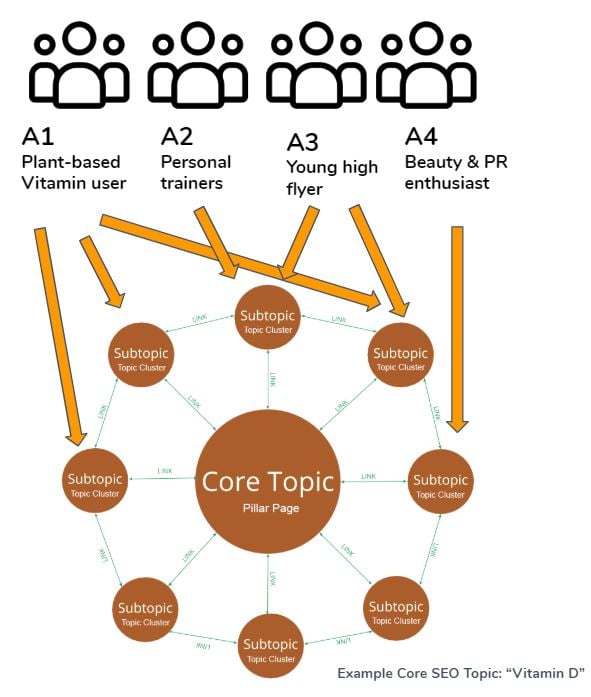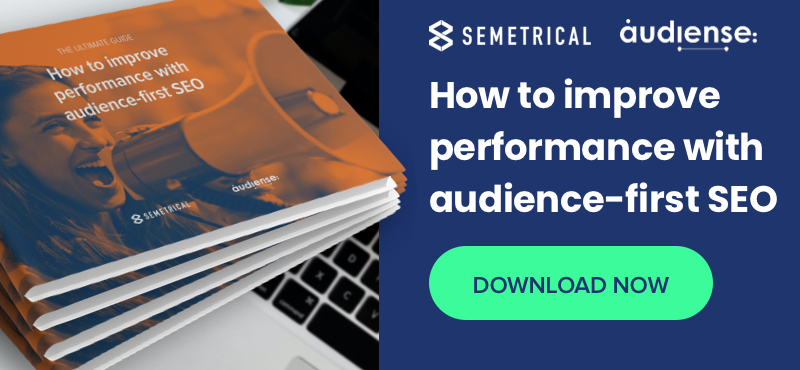How do I optimise towards an audience-centric digital marketing strategy to improve performance?
This is a guest blog written by Rory Hope, Head of Inbound Marketing at Semetrical. Rory has experience in formulating successful SEO strategies that are designed to deliver a clear ROI, SEO growth and multi-million pound revenues for global organisations.
This is the third article in a series of guides that will focus on how you can integrate your keyword intelligence and audience intelligence. You can read the first one here here and the second one here.
To succeed at modern marketing, your brand’s needs to adopt an audience-centric digital strategy that aims at being as relevant as possible to your audience’s shifting interests, conversations and behaviours. As a result of prioritising this, brands will achieve much higher engagement from relevant audiences, which includes current and potential customers.
What are the benefits of an audience-centric digital strategy?
The benefits of formulating an audience-centric digital strategy include:
- Detailed understanding of your multi-segment target audiences, informed by integrating keyword intelligence and audience intelligence research
- Optimised multi-channel lead generation funnels with content and messaging tailored based on multi-segment audience intelligence and search patterns across the funnel
- Improved SEO performance of increased keyword rankings, traffic and conversions through user intent-driven keyword intelligence, SEO topical modelling and digital PR campaigns led by interest and behavioural data of audience segments
- Paid media campaign performance improvements through data-driven audience targeting, tailored messaging and hyper relevant content for reduced CPAs and increased lead generation
- Social media campaign optimisation through enhanced understanding of target audience interests and conversations leading to improved brand cultural relevance.
How to optimise towards an audience-centric digital marketing strategy to improve performance?
Audience intelligence based on social consumer segments, developed using specific consumer affinities, provides the foundation for developing remarkably relevant brand experiences to contemporary cultural topics.
This is achieved by tailoring SEO, content, social media, digital PR and paid media campaigns around the detailed interests, beliefs and behaviors of their audiences to generate better results.
Optimise your messaging for increased relevance to audience segments
You can use your audience intelligence to tailor your campaign messaging to align with a specific social consumer segment. This approach requires coordination across your marketing teams to deliver consistent messaging to each social consumer segment.
SEO topical modelling and audience intelligence
It’s important to remember that SEO strategies need to be focused on improving the relevance of a website’s content and backlink profile to the search patterns and interest topics of their potential customers.
Advanced SEO strategies should adopt ‘SEO topical modelling’, which involves defining your priority keyword segments and their defining SEO pillar pages that will rank for the primary keywords.

These SEO pillar pages need to be supported by an on-going steady stream of supporting relevant content assets to the overarching SEO topic. These supporting content assets should internally link within your website to the SEO pillar page, as Google and other search engines will crawl your website and this is a sign of your brand’s authority for that keyword topic.
This strategy of ‘SEO topical modelling’ will lead to increased organic rankings and traffic for those priority keyword segments.
However, SEO and content teams often find their content planners being quickly exhausted of new content ideas when only targeting keywords with long-term notable search volume from Google’s data, as defined during the keyword intelligence research phase.
The solution is to align your audience segments with the relevant keyword topics to understand the overlaps of interests, behaviours and searches. Use your audience intelligence research to develop the auxiliary content assets that can support your priority SEO pillar pages that will rank organically for your ‘money keywords’ - those of which drive conversions or revenue for the brand.
Content strategy informed through social insights from audience intelligence
The benefit of developing an audience-centric digital strategy lies in the fact that marketers have a greater chance of developing immersive full funnel experiences through content that drives engagement and sales by understanding where their audience’s interests lie.
Your brand’s content strategy should be informed by social insights from audience intelligence reports relevant to each of your target audience segments. By analysing your audience intelligence reports, you can drill down into the specific topics of conversation your audience are having on social media.
If you have used your ‘SEO competitors’ or ‘SEO seed keywords’ to inform your audience intelligence report creation, then you will be able to gather social insights around subtopics within your overarching keyword topic.
The goal is to personalise your content and align it with the cultural conversation topics of your target audience segments, as a result achieving greater brand relevance resulting in improved KPIs across all digital channels.
Prospecting for digital PR and influencer marketing
You can use an audience intelligence platform to identify all of the shared interests to a specific audience segment and then inform your creative strategy for digital PR and link acquisition campaigns as a result.
This means your brand’s outreach efforts will be much more likely to be covered in relevant media publications that understand what their and your audience wants. As you earn backlinks and brand mentions, your website’s SEO will likely improve long-term.
An audience intelligence platform, like Audiense, also offers the opportunity for you to drill down into hundreds or thousands of macro or micro influencers relevant to that audience or topic.
PRO TIP - Prospect for your digital PR and link acquisition campaigns using an audience intelligence report created by uploading your ‘SEO competitors’ or ‘SEO seed keywords’.
If you have created your audience report using your ‘SEO competitors’ or ‘SEO seed keywords’ as part of integrating your keyword intelligence with audience intelligence research then you will be able to export a list of macro and micro influencers directly relevant and influential to your priority keyword segments and search marketing personas.
Google, and other search engines, place considerably more value on a backlink pointing to your brand’s website when it’s placed on a third party website that’s hyper relevant to your area of topical authority.
By using search data to inform what you upload into an audience report, you are essentially using Google’s algorithm data to enrich your audience intelligence reports. This is because the top performing ‘SEO competitors’ for your target keyword segments are there following a calculation of relevance by Google’s over 200+ ranking signals to determine relevance.
You will be focusing your digital PR and outreach efforts on engaging influencers that are determined as being relevant by both search engine data and audience intelligence social consumer data. This data enrichment process means you’ll likely yield far better results from your campaigns and thus positively impact your SEO.
Paid media campaigns: brand relevance and contextual ad targeting
If you are managing paid media campaigns, such as PPC, display or paid social; this enables marketers to ‘close the loop’ by promoting ads, content and relevant messaging consistently to the same audience segments across the funnel. Audience intelligence platforms, like Audiense, also facilitate the option of exporting audience targeting packs for paid media marketers to build their campaign targeting.
Marketers should strive for contextual ad targeting, whereby ads are placed based on their relevance to the surrounding content. An audience intelligence report will determine which websites are hyper-relevant to each of your brand’s audiences and allow for you to set up contextual based ad targeting campaigns using that data.
This approach also enhances a paid media campaign’s capabilities to reach new audiences that share similar interests to their most profitable audience as a means of market expansion. You can facilitate this through advertising campaigns using lookalike audiences that share the similar interests to your audience.







